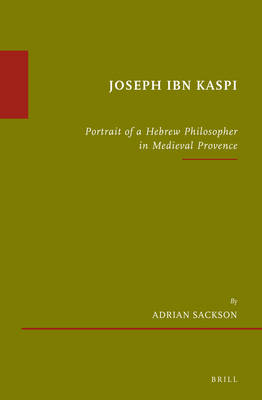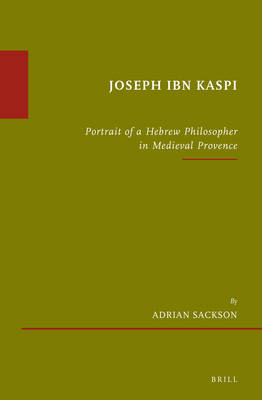
- Afhalen na 1 uur in een winkel met voorraad
- Gratis thuislevering in België vanaf € 30
- Ruim aanbod met 7 miljoen producten
- Afhalen na 1 uur in een winkel met voorraad
- Gratis thuislevering in België vanaf € 30
- Ruim aanbod met 7 miljoen producten
Zoeken
€ 224,45
+ 448 punten
Omschrijving
Joseph Ibn Kaspi was among the most prolific philosophical writers in one of the most vibrant, productive, creative periods in the history of Jewish philosophy. Born around 1280 in Provence, Ibn Kaspi penned works engaging a broad range of fields, including philosophy, theology, grammar, logic, biblical exegesis, and interreligious polemics. In Joseph Ibn Kaspi: Portrait of a Hebrew Philosopher in Medieval Provence, Adrian Sackson asks the question: What was Ibn Kaspi's overarching intellectual project? The book focuses on several key themes: Ibn Kaspi's conception of the formative (not just discursive) function of philosophy; his multi-layered esotericism; his distinct approach to the interpretation of Maimonides; his Maimonidean-philosophical approach to the interpretation of religious texts and practices; his Platonic political thought; his approach to messianism, and his attendant conception of the nature of human history.
Specificaties
Betrokkenen
- Auteur(s):
- Uitgeverij:
Inhoud
- Aantal bladzijden:
- 362
- Taal:
- Engels
- Reeks:
- Reeksnummer:
- nr. 71
Eigenschappen
- Productcode (EAN):
- 9789004338227
- Verschijningsdatum:
- 27/07/2017
- Uitvoering:
- Hardcover
- Formaat:
- Genaaid
- Afmetingen:
- 160 mm x 236 mm
- Gewicht:
- 635 g

Alleen bij Standaard Boekhandel
+ 448 punten op je klantenkaart van Standaard Boekhandel
Beoordelingen
We publiceren alleen reviews die voldoen aan de voorwaarden voor reviews. Bekijk onze voorwaarden voor reviews.











